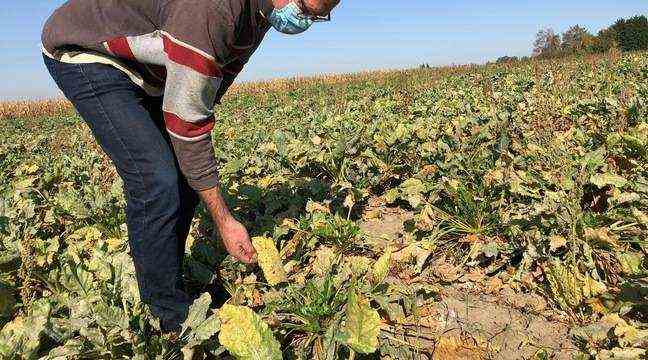Some beets affected by jaundice in an organic plot, near Douai, in the North. – G. Durand / 20 Minutes
The national health security agency (ANSES) has identified 22 alternatives to the use of neonicotinoid insecticides, which are very harmful for bees, to fight against beet yellows.
In an update of its 2018 opinion on alternatives to neonicotinoids, made public on June 2, “ANSES has identified 22 solutions to combat aphids and the disease of jaundice in sugar beet crops”, according to a statement.
“Correct but insufficient efficiency in use alone”
“These control means could take over from neonicotinoid-based products, banned since 2018, but whose use was reintroduced by exemption in 2020 for beet seed treatments,” recalls the Agency.
“These alternative solutions, which present correct efficiencies but insufficient in use alone, will require an integrated pest management approach to achieve sufficient effectiveness, or even an evolution in cultivation practices,” she specifies.
The National Assembly validated in October the temporary reintroduction of neonicotinoids, potentially until 2023, to save the beet industry. However, this type of pesticide was banned in 2018 because of their toxicity to pollinating insects.
“Four short-term solutions” identified
ANSES says it has identified “four short-term solutions”: two insecticides and two practices to be implemented in cultivated plots, mulching and organic fertilization. “In addition to these immediately usable solutions, 18 other control means should be available within two to three years,” continues ANSES.
“We focused on the two aphid species mainly responsible for the transmission of jaundice viruses, the green peach aphid (Myzus persicae) and the black bean aphid (Aphis fabae)”, explains Emmanuel Gachet, quoted in the press release.
“Testing combinations of solutions”
These alternatives to neonicotinoids “show correct but insufficient efficiencies, in use alone, to reduce the levels of damage to an acceptable economic threshold”, it will therefore be necessary to continue research and “test combinations of solutions”.
“Among the solutions, we find synthetic plant protection products of natural origin, microorganisms, predatory insects or parasitoids of aphids (parasitoids lay their eggs inside aphids), vegetable or mineral oils, which provide physical protection for beets, methods of stimulating the natural defenses of plants, the selection of beet varieties resistant to the jaundice virus and finally cultural methods combining the cultivation of beets with other plants ”, specifies the ‘Handles.

